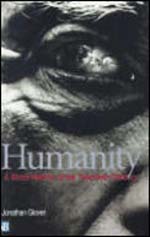 War killed an average of over a hundred people an hour though the 20th century,” writes Jonathan Glover. One can only wonder what the 21st century will bring. Glover, director of the Centre of Medical Law and Ethics at King’s College in London, undertakes the momentous task of offering a moral history of the past century. According to Glover, it is the history of the failure of our humanity and the concurrent rise of barbarism. He charts the constant threat of barbarism and struggles to build up ethical defenses against it.
War killed an average of over a hundred people an hour though the 20th century,” writes Jonathan Glover. One can only wonder what the 21st century will bring. Glover, director of the Centre of Medical Law and Ethics at King’s College in London, undertakes the momentous task of offering a moral history of the past century. According to Glover, it is the history of the failure of our humanity and the concurrent rise of barbarism. He charts the constant threat of barbarism and struggles to build up ethical defenses against it.
In writing any history of the recent past, factual error is a danger, as is distortion of perspective, oversimplification, or faulty inference. The difficulties mount if one purports to write a moral history. How is the author to avoid moralizing, biased judgments or, perhaps worse, a simple reading of history as moral progress or moral decline?
Though Glover is aware of all these dangers, he persists in his task. He believes that the moral reflection of those who have been spared the most horrendous events of the past century can be true only if it grapples with what others have suffered and done. Only in so engaging the past can we expand our moral imaginations and escape the confines of our limited social and moral experience. In the process, Glover suggests, we may also discover something about the structure of moral experience that emboldens us to struggle against forces of injustice.
Glover does not spare us the details of a century of untold blood and savagery, yet his main focus is on a reality that he believes lies beneath the horror—the fading of the moral law. “The idea of a moral law external to us may never have had secure foundation, but, partly because of the decline of religion in the Western world, awareness of this is now widespread. Those of us who do not believe in a religious moral law should still be troubled by its fading.”
Throughout most of Western history people have believed in some kind of moral order within which they made sense of their lives. Morality was justified religiously through the idea that human beings are created in the image of God, or rationally through such ideas as the notion that all humans have the capacity to know the good. These justifications are not lost to us, Glover contends.
Whether the phenomenon is called the death of God, the modern disenchantment of the world, the loss of a background of value, or the failure of an ethical attitude toward nature, Western
people’s sense of a moral order to which they can, may, or must conform has diminished. Indeed, many consider the very idea tyrannical—a denial of the individual’s right to free choice. The escape from a morally deep world was undertaken in part to celebrate freedom and to energize human creativity. Since classical moral realism—the idea that moral values are rooted in objective reality and so have fact-like status—has vanished, we need other sources to direct human life and combat
barbarism. This is the moral challenge that launches Glover’s book.
William Schweiker is professor of theological ethics at the University of Chicago Divinity School. This review appeared in Christian Century (May 17, 2003) and is excerpted here by permission.